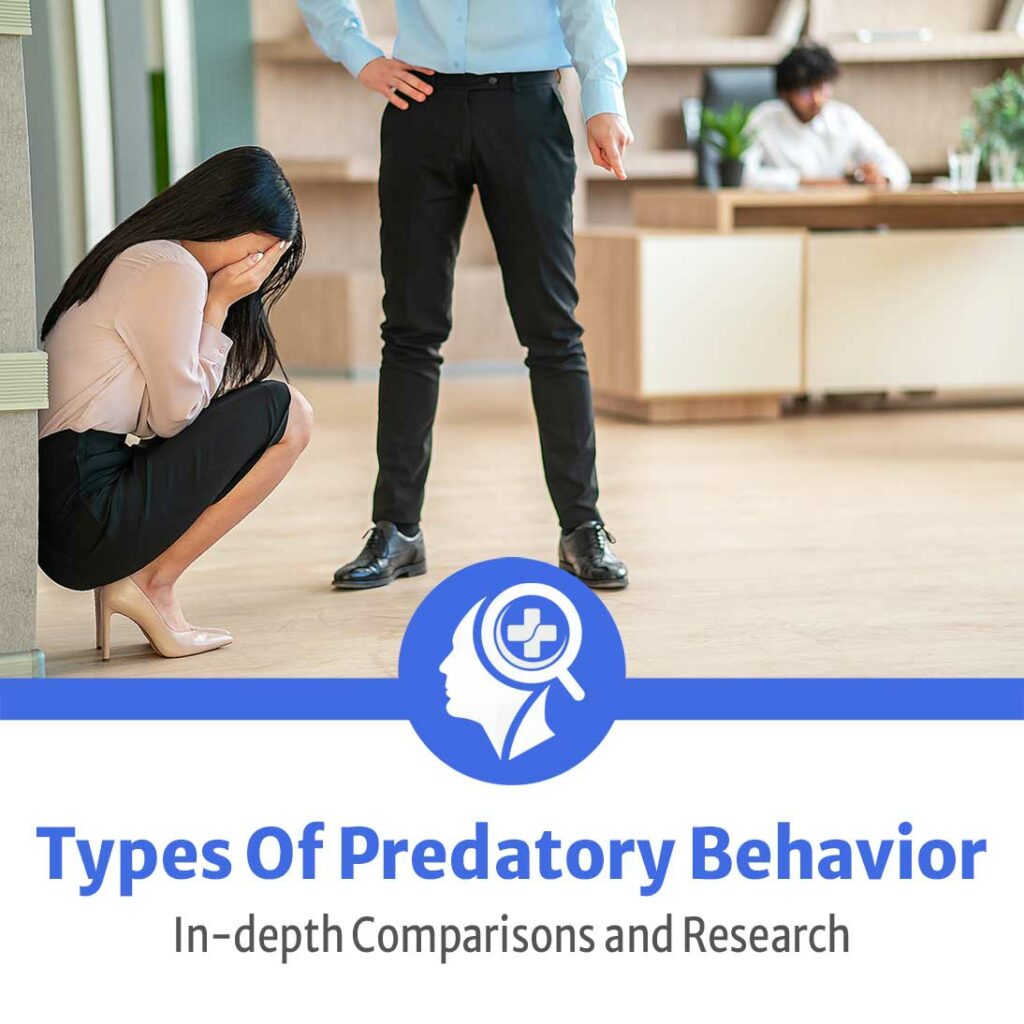
Spotting predatory behavior can be very challenging, and often we don’t even realize it is happening. It’s why often, after the relationship has ended we then see clearly what that person did and how they manipulated us.
Researchers at FinditHealth think it’s important to know the signs of predatory behavior before you become the next target. Keep reading to learn more about types of predatory behavior and what to do in the situation.

Predatory Behaviors

There are many types of predators and behaviors that follow. This could be sexual predators in relationships, or even predators in the workplace.
We will list the most common predatory behaviors you might encounter or experience.
Never Take Ownership For Themselves
One strong predatory behavior is that predators will not take responsibility for their actions and will play the victim to manipulate their victim further. Once this has been established, everything will automatically become your fault as your relationship with the predator progresses.
This can lead to internal chaos and even cause you to think you can’t do anything right. Such behavior can also be classified as psychopaths.
Keeping Close Eyes On You
In the beginning, predatory people are very attentive to the needs of their victims. This is typically shown through a lot of attention via calling, texting, and even randomly showing up at your home or workplace. While this can be innocent behavior in excess, it could be early warning signs.
Be careful of anyone trying to be around you or involved in your life 24/7. Another red flag of a predator is that they will always want to know where you are.
Manipulation
A predator is excellent at manipulating you into something you don’t want to do. This is through gaslighting, and tactics that they do to make you rethink your life and values.
A predator will make fun of anything that doesn’t meet their expectations, like your family and friends, clothing, and even your career. This is known as using manipulative language and is a clear warning sign that a predator is in your life.
The act of manipulation causes a predator to have excellent lying skills. They will easily lie and twist facts to make it seem like you are at fault. Once you believe this, the predator knows they can get away with it and will continue playing the game of manipulation.
Emotional Predator Signs

Flawless But Not In A Good Way
One of the first emotional predator signs is that they seem flawless or too perfect. Like they will have everything together and the perfect dream life. When predators have very low self-esteem, they showcase this carefully curated image of themselves to hide this fact.
Predators thrive on control and power as a way to distract themselves from their internal pain and chaos.
They are masters of deceit with their sociopathic and narcissistic tendencies. They will distract you from their faults and blame others instead for their shortcomings.
They may also not have social media or an online presence. This is because they protect their privacy and tend to reinvent themselves every few years to con other people. It also could go back to narcissism as predators thrive on thinking highly of themselves and maintaining their privacy.
Entitled
Another emotional predator sign is that they are entitled in that they believe everything is owed to them. That they have a right to do whatever they want, and others only exist to serve their needs.
Predatory people will often get away with crimes or be known as a rule-breaker. In their mind, they can do anything and get away with it.
They Avoid Intimacy
While they will do everything they can to get involved in your life, they will avoid intimacy. For some, they avoid it because if they get too close, they will feel emotionally connected. Some predators avoid emotional connections, whereas others are psychologically wired not to pursue them.
They Use You For Your Own Advantage
The last emotional characteristic of predators is that they will use you for their own personal advantage. They learn weaknesses and sensitive information so they can push your buttons and push you into doing anything that serves them.
This can be done by intimidation, embarrassment, and even shame, so you feel small and unworthy. Their goal is to make you think you need them to feel good about your self-worth. It’s a classic example of codependency.
Predatory Behavior In The Workplace

It can be challenging to spot predatory behavior in the workplace. As you start a new job, everyone is generally lovely and friendly and wants to know more about you.
But there are very vital things to keep an eye on for predatory behavior in the workplace.
They Are Always Right
A classic example of workplace predatory behavior is people who are never wrong but always right. They will be incapable of admitting they have done something wrong and will always put the blame on others. A predator has a need to control everything, including how others perceive them.
Mixed Signs
A predator will always demonstrate hot-cold behavior. For example, they will bring on the charm once you get to know them as a way to learn everything about you.
It’s important to note that this charm is fake, as predators are masters at faking emotions to get what they want. They will often fake kindness, empathy, vulnerability, and even intimacy to discover your weaknesses and exploit them later. Once they know you or feel like they have gained your trust, they will start to act differently to increase their control over you. This could be through small mean comments or anything done or said to lower your self-esteem and confidence.
How To Deal With Predatory Behavior

If you are concerned with predatory behavior or have someone that is currently a predator in your life, we highly encourage you to seek help. If it’s a romantic relationship, we will encourage you to leave and get out of the relationship to create distance from the predator.
If it’s a professional situation, discuss it with your boss or employer and get their help on how to proceed forward. You never know if other co-workers are affected, so maintaining a healthy workplace environment is crucial.
You could always reach out to family members and friends as a way of support but therapists can also be helpful. Finding and talking with a licensed therapist can also be incredibly helpful, especially if they have prior expertise and experience in predatory behavior. They will help you determine how to handle the situation and the steps you need to take to get the predator out of your life.
Therapists can be found in your local community or easily online if that makes you more comfortable. They will provide a non-judgmental space to heal and help you with any lasting effects a predator relationship has caused to you. Research has shown that any relationship with a predator (regardless of personal or professional) can hurt your mental health and cause depression, stress, anxiety, and lower feelings of self-worth.
Frequently Asked Questions

What is considered predatory behavior?
Predatory behavior is a broad definition and is applied to personal and professional relationships. This type of behavior is anything that is done to gain control over you to be later used to manipulate you. Predatory behavior is anyone using you for the sake of their self-worth or advancing in life.
What does predatory behavior look like?
Predatory behavior ranges from someone using manipulation tactics, keeping close eyes on you, using you to their own personal advantage, and never taking ownership of their actions. It also could be someone who seems too perfect, highly entitled, and avoids intimacy and emotional connection. Another red flag for predatory behavior is that they will always want to know where you are.
What are the characteristics of predatory behavior?
Characteristics of predatory behavior are someone that seems charming at first, but you soon realize this is a mask. Predators will only use others to get what they want to advance in life. A desire for power drives this, so they feel in control of everything.
Predators learn weaknesses and sensitive information to push your buttons and push you into doing anything that serves them. They are masters of deceit with their sociopathic and narcissistic tendencies. They will distract you from their faults and blame others for their shortcomings.
Conclusion – Research by Findithealth.com


It’s essential to be aware of the common signs of predatory behavior because predators are skilled at fooling others. We at FinditHealth hope these signs of predatory behavior are helpful as you determine the safety of your situation and if you are dealing with a predator. If needed, ensure you get help, especially if you feel unsafe.


